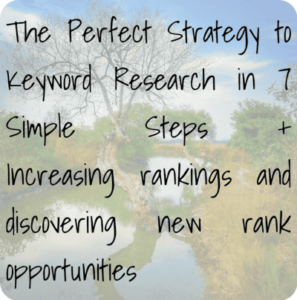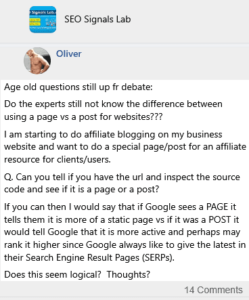Jesse Neubert 🎓
Content Strategy: Building the Plan (excerpt from one of our BrandBoostr Content Guides)
Don't show up to gameday without a well-thought out strategy! Authority sites are built on the foundation of a solid content plan aimed at capitalizing on opportunities and prioritizing value for visitors.
Below is a Framework to Use in Conjunction with your Keywords to Map Out a "Winning Formula"…
1. Identify all major themes for your niche and organize them into topic clusters by known keywords, themes or other aspects that make sense for your niche/industry/audience.
2. Bring in your keyword research (conducted prior), including traffic, competition, and other data. Organize these under the major themes and topic clusters from #1 above.
3. Score the quality of currently ranking content across you're the themes and topic clusters identified in #1 and rank this using a simple rating system of 1-2-3-4-5. Repeat this for your keywords under each theme/topic cluster.
4. Calculate an ‘average score' for your topic clusters and themes based on difficulty (to rank), quality of content needed to complete, and/or the cost in terms of time and resources to dominate.
PRO TIP: Look for content clusters where competitors are ranking with thin content, little to no links, and/or where there is an opportunity for content depth or breadth (i.e. expanding on the topic…especially if competitors have failed to do so).
5. Run a Content Gap Analysis in your favorite SEO tool. We suggest SEMrush or Ahrefs for this (guide on the next page). Add these to your content clusters from step #1.
PRO TIP: Don't have Ahrefs or SEMrush (sign up for a trial). Still not an option? Then manually look for the following missing from your competition's content:
• Freshness / frequently updated content
• Thoroughness – do they adequately cover the topics?
• Usability – is the content approachable, readable, etc.
• WOW factor – is the content engaging, fun, conversational
Does it use graphics, videos, media or other elements that make it ‘pop'?
📰👈
69 👍🏽11 💟80 26 💬🗨
Nice post!
How do you create your topical keyword clusters in local SEO?
For example say you want to rank a page for "roof repair mckinney tx"
Do you want the city name in the keyword clusters or just on the pillar topic
💟👍🏽2
I typically do like to use the GEO in the pillar as well as that pillar's supportive pages. But no need to go overkill.
Put the GEO in the H1 and an H2 or two. Then use some local anchor points relative to that GEO (perhaps
as resources). For plumbing that could be a local hardware store, directions to your place of business, etc. For a lawyer it would be a local court house, police station, etc.
Circling back to your question…
If the cluster's pillar page is targeting "Chicago Plumber", supportive pages of that cluster might be "Drain Repair Chicago", "Leak Repair Chicago", "Toilet Replacement Chicago" and so on. All inking to the piller page to 'power it up'.
You can take an original pillar + cluster and make that its own little cluster of an even bigger topic.
In that case, the Chicago Plumber pillar page along with other major city pillar pages could make up a ring with each pillar linked to "Cook County Plumber" etc.
Bad example as I like to keep cities that large in their own cluster, but you get the overall idea.
Nathan
Makes sense. You definitely don't want to use the word "plumber" in any of the cluster page titles as that could cause those to rank against your pillar page .." Chicago plumber"
Jesse Neubert 🎓 » Nathan
Exactly. In that example, I prefer to focus on individual services
Nathan » Jesse Neubert
Do you typically interlink those cluster pages into a silo?
Eg. Pillar page links to one of the cluster pages
All cluster pages link to pillar page
cluster pages link to each other
Jesse Neubert 🎓 » Nathan
So i take a bottom-up approach, using a 'power up' strategy that ranks and gives a lower competition page authority, then leverages clusters of those pages, powered by supportive pages, to then power the next cluster/supportive pages in the next higher rung of competitive phrases.
Those pages then in turn power up the next level pillar page and so on.
So I don't take a traditional silo or pyramid approach.
Its also mapped based on the niche and goals and budget to get the most from what we're working with.
Example of a model below. These can be modified for any goal.

Jesse Neubert 🎓 » Nathan
I'll write a separate post on my 'Reverse Cluster' approach this week or next to clarify
Nathan » Jesse Neubert
Based on your diagram it looks like you have a pillar post surrounded by mini pillar posts…that are surrounded by supporting posts
Jesse Neubert 🎓 » Nathan
That's close to the just of it at the simplest approach.
Think of building a framework, turning what most would consider a supportive page, into its own mini-pillar being propped up by its own supporting pages.
Each is designed to tackle various aspects such as relevance, authority, Rankbrain/FAQ/commonly asked questions, etc.
By doing so and working your way up each level, using the actual piller page of each level to power up the next, you can gain the greatest amount of traction with the least amount of external backlinks.
Nathan
And as you get farther out you don't need geo keywords…can just write evergreen content that ranks on it's own
Kim
Thanks, I found this very interesting and helpful, but i'm wondering about how closely connected the support pages should be to the pillar content. I'm working within debt refinancing and one pillar page might be "become debt free" would good support content then be different suggestions for how to get debt free, or would it rather be synonyms for the keyword itself?
💟1
In that case, I would use different ways to become debt free as supporting pages. You could also use FAQ or Google suggested questions as supporting pages for both the pillar page AND the supportive pages themselves.
Depending on how deep you want to go, each supportive page could also have its own small cluster of pages powering it up as well.
Some topics have more depth. But when they don't I like to use FAQs, Google Suggested Questions, Related tools and/or resources (also an affiliate opportunity for cross sales/revenue), etc.
Nathan » Kim
Just remember to try to avoid using the same keywords for pillar page and supporting pages.
I'm having to deal with fixing an issue of supporting pages ranking for the same keywords as the pillar page. I didn't use the same exact match keyword in the titles however I had partial matched keywords
📰👈
These may satisfy you:
» The Perfect Strategy to Keyword Research in 7 Simple Steps + Increasing Rankings and discovering New Rank Opportunities
» The method of posting in GMB that affects ranking | Keyword Research, Content-Type







